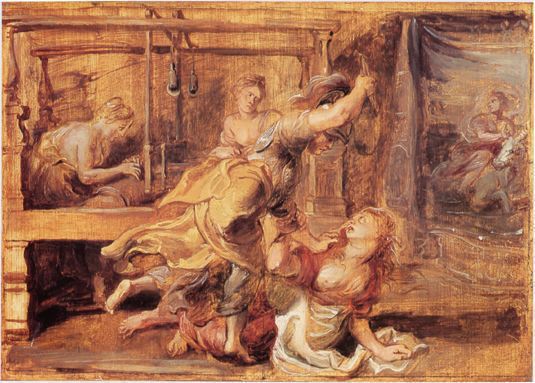 |
| Rubens' Arachne (1656), having angered Minerva |
Maybe what is "tricky" is the (wrong) habit of mind of thinking of ourselves not as social actors, but as individuals. Because once you say "I am acting as part of the social/biological (S/B) whole", then every action becomes more understandable. Because we are so woefully ignorant of the extent to which we are S/B caused, it is a priori easier to think of ourselves as individuals.
I've always wondered whether there isn't a lot of ancient - that which has been passed down in religious and cultural tradition for millenia - knowledge intuiting the idea that there is no individual, that there is only the social us. The idea might be that man's greatest delusion is when he stops thinking of himself as owing all that he is to his family, his neighbors, his community, his biological tendencies - to be silly, to be jealous, to be envious, etc.
I was just reading the Greek myth of Arachne to my daughters. In it, Arachne challenges Minerva, a God of crafting, to a weaving duel, despite the fact that as God of crafting, Minerva would have been responsible for all of Arachne's knowledge. When Arachne wins, Minerva is so angered that she turns Arachne into a spider.
If it is a fact that one's talent must come from S/B - in the myth's case, a particular God - then the claim that one's talent comes from oneself is the height of arrogance and lack of humility. "God", in this case, can be seen as a stand-in for the natural, objective world. To deny "God", would be tantamount to denying reality, saying 2+2=5.
To the ancients, without the conceptual framework for scientific naturalism, God could be seen as a stand-in for universal truths of reality. I'm out of my depth, but could the myth of Adam & Eve be seen as a caution against expressing a similar arrogance, in that the forbidden fruit, the "knowledge" they ate was the idea that they were self-originating, as opposed ot S/B, and that this was ultimately an affront to reality?
I realize I'm stretching a bit, and maybe reading a bit much into it. But this idea of the self/individual vs. the group seems a concept enormously central to humanity's understanding of itself, consciousness's understanding of its own limitations and spatial relationship with realty.
No comments:
Post a Comment